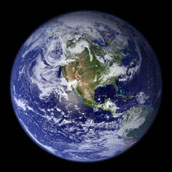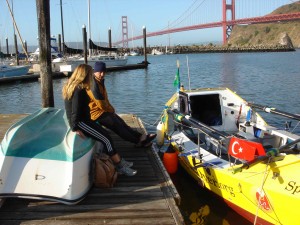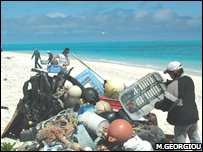
I am now be geographically a long way from the Pacific, but the ocean remains very much on my mind - especially as I learn more every day about the scale of the plastic pollution problem.
Here is the latest "Pollution Postcard" to come to my attention: a video showing what was trawled up by Captain Charles Moore on a recent trip to the North Pacific Gyre, and some disturbing expert commentary on the implications for human health.
I am becoming more and more aware that there is no "away" - as in "throw it away". Nothing leaves the planet. All our waste has to go somewhere, and the Earth cannot indefinitely absorb our garbage. Increasingly the waste products that we have carelessly disposed of are coming back to haunt us.
Thanks to Carol Mone, a Woodside friend, for sending me this link.
|
|

Looking at the recent comments on my blogs, I will say that it was nice to be missed. And I'd like to tell a story of missing something much bigger than me - Australia.
On July 12 last year, while I was enjoying a launch event at San Francisco's Presidio Yacht Club, a solo male ocean rower was departing the California coast. At his third attempt, Erden Eruc finally managed to break contact with land and row out into the Pacific. He was planning to row nonstop to Australia.
Nine months later, the equatorial currents have had their wicked way with him, and he has missed Australia - not, I should stress, due to any lack of navigational ability. He knew exactly where he wanted to go. But the currents had other ideas.
After bobbling around in the ITCZ for what seems like an eternity, Erden is currently about 1000 miles north of his originally intended landfall, having failed to get south of the Equator. He is now hoping to reach the Philippines.
Selfishly, I was grateful last year that Erden had demonstrated the difficulty of getting away safely from the California coast, the most dangerous part of the crossing. And now I can't help but appreciate him showing how hard it can be to get to where you want to go when your chosen means of transport is an ocean rowboat.
I do hope that at last the ocean gods will smile on him, and allow him to safely reach dry land.
You can read more about Erden's adventure at his website.
[photo: me with Erden and his boat in front of San Francisco's Golden Gate Bridge last summer]
|
|
HUGE apologies for not having blogged for so long. I am still alive and kicking and last sighted in Washington DC, via a hectic weekend in New York.
I attended 4 Oxford University events in as many days, in both New York and DC - networking with the great and the good and rustling up some funding.
I am now in DC for a series of meetings with various environmental organizations. There's lots of really good stuff happening, but all slightly speculative at the moment - I will tell all as things become definite.
I am just now dashing off to a "Seaweed Session" - a social occasion organized by the nonprofit that I row for, the Blue Frontier Campaign. Must run, but will write again soon!
|
|

The environmental time bomb represented by plastic in the world's oceans has at last come to the attention of the media. Thank you to the many people who have sent me links to recent coverage in the British press, much of it arising from the publication of a study by a team at the University of Plymouth.
Dr Richard Thompson suggests that microscopic pieces of plastic are being eaten by similarly microscopic organisms - and the digestion process then releases the toxins (like DDT) from the plastic. The toxins are absorbed by the tiny creature, which gets eaten by the slightly larger creature, and so on up the food chain. All the way up the food chain the toxins accumulate, until at the top of the ocean food chain are the carnivorous fish - which get eaten by us. So we end up eating the poisons that we created.
So what goes around comes around - and in a very obvious way. How could we ever have thought it would be otherwise? We live on a planet of finite size. We have polluted it and abused it with growing intensity, as our population has increased and our appetite for processed food and manufactured goods has increased. And the oceans have for a long time been regarded as a bottomless landfill - out of sight was out of mind.
But even the oceans, vast as they are, have reached their limit, and now we are reaping what we have sown - we are eating our own man-made poisons.
Do take a look at this article, and also follow the links on the right to other articles.
There are also links and articles on rozsavage.com, including an article kindly written by Dr Richard Thompson specifically for my website. Follow the links to other pages on this site revealing some startling facts and what we can all do to help. Click here for more on Oceans in Crisis.
|
|